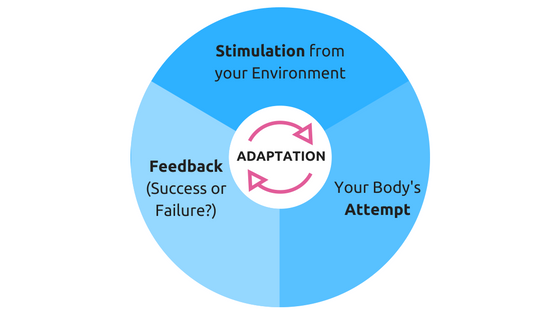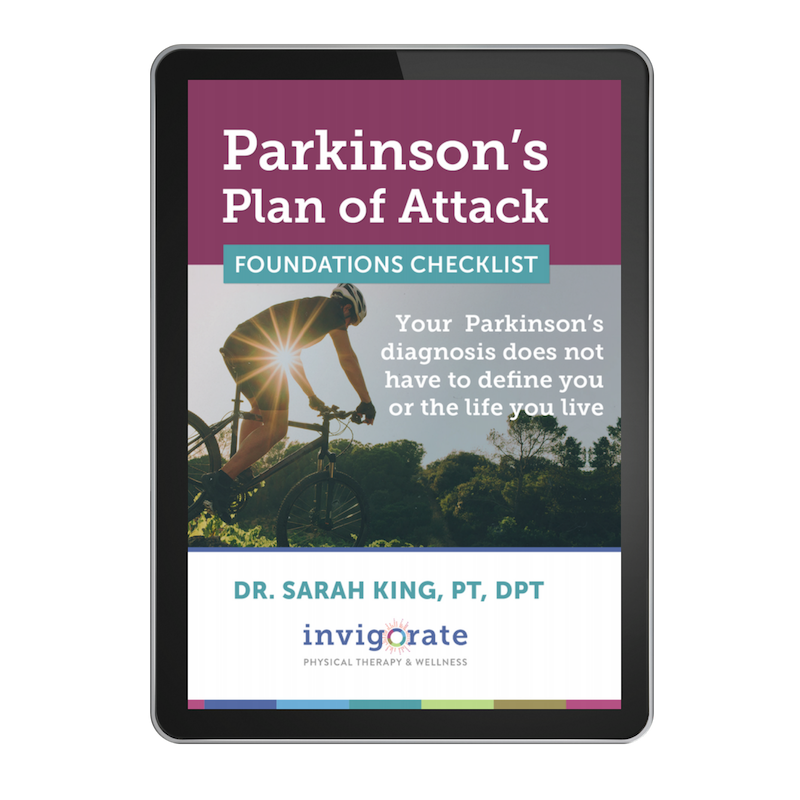CLICK PLAY TO WATCH: Dr. Sarah King, PT, DPT discussed the topic of mindfulness during your Parkinson's exercise program on a LIVE Facebook broadcast. Click play to watch the replay.
Today's topic stemmed from a question from Bob, who is a client of mine.
(Truth be told, I get this question from 75% of my clients.)
He wanted to know: "Can't I watch TV while I workout? It makes time go by so much faster!"
Bob's thought was that, so long as he was moving his body, it didn't really matter what his brain was up to. He didn't see a need to mentally attend to the task at hand. In fact, if he could check his email, flip on the TV, or hop on the phone while he was pedaling his bicycle, he found he could stay on the bike a little longer than if he was just watching the time go by.
How many of you flip on the TV while you're on your exercise bike or treadmill?
... My guess is that Bob's not alone.
Here's the issue: If you're not fully focused on the task at hand, you're training your body to ignore your brain.
Brain-Body Connection
There are 2 issues common to Parkinson's that are at play here.
1. Your BRAIN has trouble getting messages from your BODY.
This decreased awareness - called "proprioceptive awareness" - is a by-product of your brain's ability to process information it's getting from your body's sensory systems. Proprioceptive awareness tells you where your legs are relative to the ground, how tall (or not) you're standing, or how far you're reaching for that cup of coffee on the counter. It relies on your BODY sending lots of signals to your BRAIN.
2. Your BODY has trouble getting messages from your BRAIN.
Then, when your brain decides it wants the body to act in a certain way - say, walk across the living room - it sends messages to your muscles to start the movement and make it as accurate as possible (so you don't trip or fall over). Dopamine, the brain-chemical that's significantly reduced in Parkinson's, helps regulate this conversation. Since there's less dopamine present, your body's movements are smaller and slower than your brain intended.
In the simplest terms, your brain and your body aren't communicating as well as they did in the past.
... Does that feel like you?
... Do you tell your body to do something and it doesn't quite listen the way it "should"?
... To take it a step further, do you notice that you feel more "connected" and fluid with your movements after a good workout?
This is where exercise and Parkinson's is so critical and, as we'll learn soon, why mindfulness during your workout is a key factor in improving your symptoms in the long-run.
The Name of the Game: Adaptation.
Your body is wired to survive. In order to make sure you don't get eaten by a lion or succumb to the elements, your brain is always gathering information from your surroundings and your body is always repairing and healing itself.
You're constantly responding to stimulation from your environment, analyzing it, and adapting your body so you can more easily do the activities that keep you alive and well.
This is why weight lifting makes you stronger... why practice makes you better at playing the piano... and how you learn to walk..
This is called Adaptation.
The key to adaptation is your brain's ability to get feedback from your body about how well you performed the task at hand.
If it WAS successful, great! Your brain and body already know how to do what you're asking it to, and have no reason to adapt or change anything.
If it WASN'T successful, it probes into why: Were you too weak? Lacking energy? Did you undershoot your target?
Failure, because of challenging conditions, is where the magic happens. Once your brain has a good idea of why you failed, it tries its darndest to adapt your body so you can be successful the next time you try the same activity.
TRANSLATION: Your brain and body get stronger, more balanced, and more coordinated when you challenge yourself beyond your limits.
...which brings us back to watching TV and working out:
1. When your brain is "tuned in" to the TV, it's "tuning out" any feedback from your body. Thus, it's not getting the feedback it needs to adapt and improve. What's the point of working out if you're not getting stronger in the process?
2. If you're able to focus on a TV show, your workout is likely not challenging enough. This is something I've discussed before. If you're cruising at a comfortable pace, you're not giving your body any reason to improve or adapt. Again, what's the point?
As you can see, focused, intense exercise not only protects your brain from degeneration, it's also the stimulation your brain needs to re-connect with your body!
Mindfulness and Parkinson's
"Mindfulness" refers to the process of bringing awareness to a moment-by-moment experience in a compassionate and non-judgemental manner.
As we're talking about turning off the TV during your workout, we're really saying that exercise is most powerful when you're fully present and mindful of what you're doing. Recently, research on this concept of mindfulness and Parkinson's has exploded.
Not only does mindfulness training (like meditation, Mindfulness-Based Stress Reduction Training, and breathing techniques, to name a few) help improve anxiety and depression, but it also enhances attention, working memory, and executive functioning. On a molecular level, dopamine was found to increase and stress hormones were regulated with mindfulness training as well.
You can see why we could benefit from seeking out mindfulness in every aspect of our lives. Which brings us to...
Adding Mindfulness to Your Parkinson's Arsenal
By now you're recognizing that there are significant benefits from being more mindful and attentive to yourself, your surroundings, and your workouts.
Here are 2 ways you can incorporate a mindfulness practice into your daily life, starting today:
1. Tune-in to Your Workouts
While you're going through your workouts, focus on each aspect of your movement. Are your fingers spread wide? Are you standing up tall? Add in exercise that forces you to memorize a sequence like yoga, boxing, Tai Chi, or Cui Gong. The Parkinson's Wellness Recovery (PWR!) Moves strung together as a "flow" are another great brain-body connector.
2. 10-Minute Morning Mindfulness
In the first hour of your day, carve out 10 minutes to sit quietly for a mindfulness practice. This can be simply breathing deeply and focusing on your breath. You can also do a simple mantra meditation (here's a how-to video I love) where you silently repeat one word in your mind and center all your attention on this word.
Incorporating these two changes into your workouts and daily life will only elevate the potency of your exercise program and bring more clarity, calm, and connectedness into your world.
How Mindful are You During Your Workouts?
I'd love to hear from you! Do you tune your body out during your workouts? Do you practice being mindful as part of your daily routine? Tell me about your experience in the comments section below.





